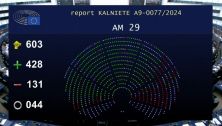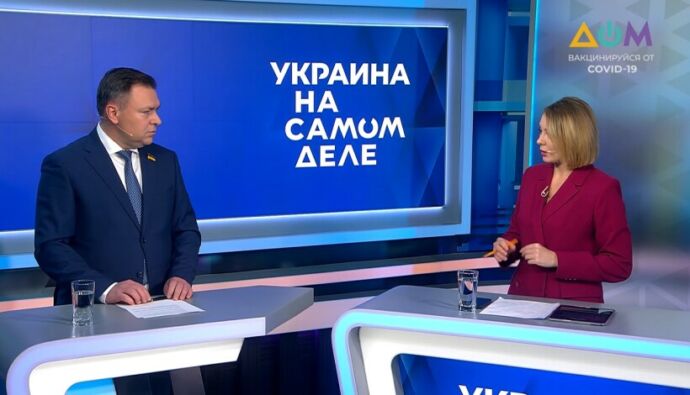Russia is increasing combat training in the occupied part of Donbass. Thus, large-scale military exercises involving reservists began in Luhansk and Donetsk. According to the Main Intelligence Directorate of the Ministry of Defense of Ukraine, the measures are controlled by the commission of the 8th All-Military Army of the Southern Military District of the Armed Forces of the Russian Federation. Propaganda media were also involved in spreading fake news.
The possibility of further Russian invasion of Ukraine in the program “Ukraine in fact” on UA TV is being discussed with the Chairman of the Verkhovna Rada Committee on National Security, Defense and Intelligence Oleksandr Zavitnevych.
Alyona Chornovol hosts the program.
– Your assessment: what is happening now on our borders regarding the accumulation of Russian troops?
– First, I would like to emphasize that these accumulations of equipment, its movement near our border at a distance of 100-200 km – all this is monitored by intelligence, tracked by the Armed Forces of Ukraine. We have pictures and numbers.
Secondly, since 2014, our Armed Forces have already learned to fight and fight back.
In addition, it is not just about countering armed aggression. After all, today our enemy can turn anything into gas, both gas and refugees. And today we can single out all these things and prevent them
– But Russian spokesmen claim that Ukraine is “provoking” and is going to “use force to resolve the situation in Donbas.” How do we react to this?
– Such statements from them sound constantly. On the subject of the same [spokesman for Russian President Dmitry] Peskov, there are statements about open talks with pseudo-republics, direct dialogue with them.
Option of Russia’s pressure on Western partners through the gas pipeline. Like, or aggression against Ukraine, or pipe and gas to Europe. This includes the certification of Nord Stream-2 and the launch of this Russian gas pipeline.
– Among other things, Peskov already directly says that the implementation of the Minsk agreements is a guarantee of security for Ukraine. What do they incline us to do in this way? To any interpretation of the Minsk agreements?
– This is stumbling on the spot. Russia has repeatedly said it is not a party to this war. Therefore, in particular, there are no changes in the negotiations within the Tripartite Contact Group.
We are constantly trying to return Russia to international law, and not to delay the process of peaceful settlement of the situation in Donbass.
– Do we assume possible destabilization on the part of the Russian Federation?
– There is no specific answer to the question “will it be or not, and what to expect”. Because no one knows what is in the minds of the Russians and Putin specifically. No one knows.
But we as a state need to be ready for anything. And not only to the Armed Forces. With the beginning of the war, our people changed their thinking a bit. And we can say that many more people became Ukrainians. Much more. And the adopted law on territorial defense is about feedback that comes from people. Yes, so far we cannot say that this is a huge victory. But earlier such an initiative was not even mentioned. But it is very important and necessary.
– Apart from the sanctions pressure from our Western partners, who and what can really help us?
– What we can say with confidence is economic aid and weapons.
We see the real result of Volodymyr Zelensky’s visit to the United States. This is additional assistance, real weapons. And our partners are ready to continue to help us. And this year everyone saw a different reaction from our Western partners. In fact, it is the economy, and in fact it is armaments.
After each joint military exercise, we hear positive feedback about our military from not just full-time units, but from international coaches, coaches, and people with the highest level of training.
– The situation on the border with Belarus. What should we do there? This is more than a thousand kilometers. We have already heard miscalculations about strengthening the border, which will cost about UAH 17 billion.
– Yes, it is necessary to strengthen. Because on the main section of the section, our border with Belarus is columns, a dividing strip, and nothing more. There are, of course, border patrols more…
That’s when signals of a possible crisis on the border with Belarus began to arrive in the summer, our Verkhovna Rada committee together with the Border Guard Service drafted a bill to amend the law “On the State Border Guard Service of Ukraine.” It’s about using weapons during detention, it’s about taking extra coercive measures. The bill was approved by the Verkhovna Rada, and we began to implement this initiative. It is a real tool that will allow border guards to act, apply and protect, in particular, themselves.
Border guards are the first line of defense. Therefore, now additional funds will be allocated for border guards to strengthen the border.
Many questions about the border. We constantly violate them. These are both demarcated plots and land issues regarding these territories. Many things.
A small “pshyk” came out. If we do it now, we just need to take, build and do, according to all the standards we already understand. We have the experience of war, and we already have an understanding not just at the level of “barbed wire”. No, the border is a much more complex engineering structure, equipped with many things.
– Given the friendly alliance between Lukashenko and Putin, today we understand that in our country, in addition to the eastern border of Ukraine, the northern one may be in danger.
– Of course, there is always a threat. And we saw this in particular during the Belarusian-Russian exercise “West-2021”, which took place in September. And Russian exercises in the spring – on the basis of the occupied Crimea.
After analyzing these exercises, we also took this into account in terms of strengthening our borders. In the coordination of different types of armed forces or different security and defense forces.










